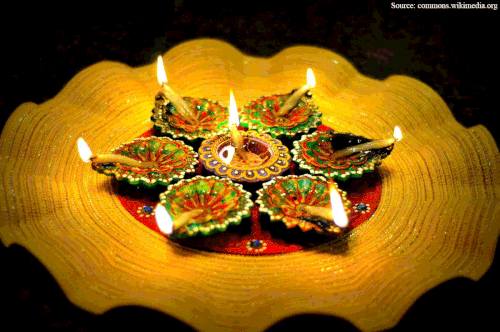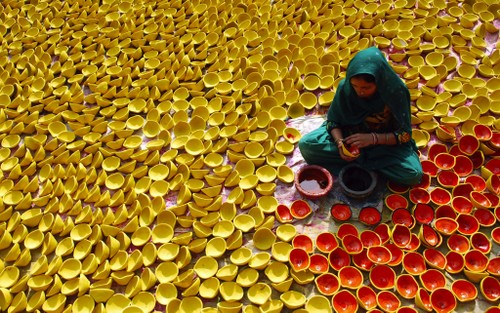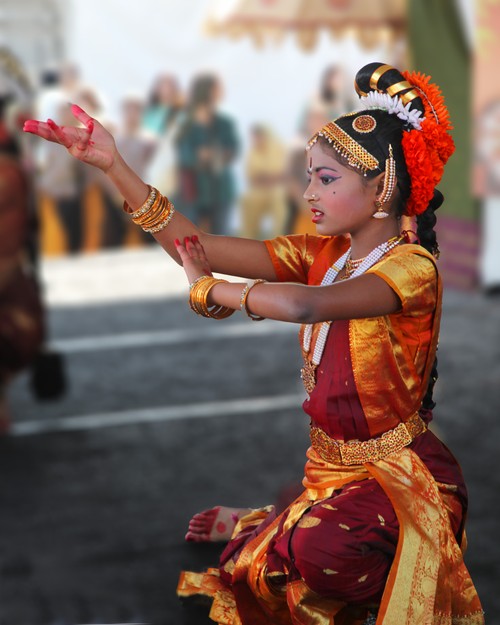(VOVWorld) - Diwali, the festival of lights is India’s biggest most important holiday of the year. The festival has been brought to Hanoi by the Indian embassy to introduce India’s unique culture to Vietnamese people. Dieu Ha reports:
Diwali is the five-day Indian festival of lights celebrated by Hindus, Sikhs, Jains, and Buddhists around the world. While the holiday is observed by people of different faiths for different reasons, they all acknowledge its underlying theme: the victory of good over evil and the triumph of light over darkness. Diwali started as a festival that celebrated the last harvest of the year before winter began. Indians would thank and seek blessings from Lakshmi, the goddess of wealth and prosperity, as they closed out one financial year and looked ahead to a new one. Many Indians continue this tradition, marking the day after Diwali as the first day of the new financial year. Diwali gets its name from a combination of the Sanskirt words for "light" and "row," as many Indians use rows of clay lamps to decorate their homes and temples.
 |
| Diwali lamps. Source: Wikimedia |
Celebrated in October or November each year, Diwali is the biggest and brightest festival of Hindu people in India. Homes are cleaned and windows are opened so that Goddess Lakshmi can enter. People light lamps to light the way for the goddess. Sumi Shenbagan, who has been living in Vietnam for 2 years, says Diwali is as important to Hindus as Christmas is to Christians.
“It’s the same. People take a lot of pleasure in wearing new clothes and preparing sweets and savories to give to friends and family. The whole house is lit up; the whole town and the whole country are lit up with small, beautifully painted lamps called deepa. Deepa means light. Diwali is the festival of lights because people light the small lamps and also give the lamps as gifts.”
Rituals and preparations for Diwali begin days or weeks in advance. The festival formally begins two days before the night of Diwali and ends two days after. Each day has its own rituals and significance. Sumi again:
“India is a very big country. In the North we celebrate Diwali for 5 days but in the South, it is only for 1 day. Before Diwali, when we buy gold because we think of Goddess Lakshmi, the Goddess of Wealth. To welcome her, we buy gold, silver or whatever, according to how much you can afford. On the day of Diwali, in the evening, we celebrate Lakshmi … (name of the festival), we pray to the Goddess. The next day is New Year. So it’s mainly about the Goddess of Wealth and the new year.”
 |
| The making of small lamps for Diwali. Source: The Financial Times |
Diwali festival in Hanoi was held just like the one in India. Fireworks were set off against a background of exciting Bollywood music while sexy belly dancers entertained the crowd. For Warren Giles of Australia, it was the traditional Indian food at the festival that attracted him the most.
“I love Indian food, a big fan. The food is fantastic. I saw a lot of big performances. So much culture here, the people, the colours.”
Do Khanh from Hanoi told VOV:
“I love it. It’s really unique. I came here at the invitation of a friend of mine and it is fun. I see many Indian women in their traditional clothes, which I only saw in movies before. I’ve tasted many Indian traditional dishes and I particulalry like the curry. There are also live music and dance performances and Bollywood films. The one I enjoy the most is a dance by children.”
 |
A community dance for Diwali Festival. Source: Wikimedia
|
Tuan Anh, another festival goer, said this year's Diwali in Hanoi helps him better understand Indian culture:
“Even though I came here just for fun, I talked to some Indians and learned a lot about their culture, about the meaning of the Diwali festival and why it is called Diwali. I think more events like this should be organized so that we can learn about each other.”
Hanoians were treated to traditional and modern dances, culinary arts, and interesting cultural features such as yoga and traditional handicrafts. Diwali has become a regular activity of the Indian community in Vietnam.